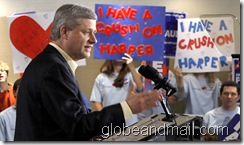Hands up anyone who recalls a little spat between the parliamentary press gallery and the Prime Minister's Office over who gets to decide who asks questions during a prime ministerial newser?
Anyone?
Didn't think so.
One of the things Stephen Harper can add to his list of accomplishments is taking the cajones from reporters in the Ottawa press gallery.
The crowd that prided themselves on supposedly liking their meat raw and freshly stripped from the hide of an unsuspecting politician are now dutifully chowing down on whatever scraps their PMO handlers toss them.
Like the whole Daddy Steve series of photo opportunities.
Or the photo gracing the front online page of the Globe this nearly last weekend of the campaign.
 It shows the PM in front of a couple of signs held aloft by what appear to be adolescent women.
It shows the PM in front of a couple of signs held aloft by what appear to be adolescent women.
The signs read "I have a crush on Harper".
Does this not strike anyone as bizarre, in the extreme?
Let's leave aside for a moment the fact the young women appear to be holding the signs carefully so that the photographer they are evidently aware of cannot catch their faces.
When was the last time you can recall a political leader stirring the loins of young women or men in this country spontaneously?
Anyone?
Exactly. And in this instance, it is clearly nothing more than an organized event, a complete contrivance.
The Conservative Party campaign is so hermetically sealed that a young woman from a television show with her credentials intact is hustled from the room and slapped in handcuffs. There are many media events where the Prime Minister simply does not take questions.This is not an environment for spontaneity or sarcastic protests.
Nope.
These sign holders - with their perfect cut out letters and oddly matching design layout - were very likely officially approved participants in the photo op.
What we are looking at here is a fabrication.
They are like the stories of Harper at his high school reunion or with a family, especially babies.
They are to news coverage what those e-mails abut Viagra and some Nigerian bank official with bags of American cash are to your e-mail inbox:
Spam.
However, the taming the gallery goes considerably further than just the odd stunt photo passing as something real. People die from tainted meat. The agriculture minister discusses the issue on a conference call with government officials and places the handling of the crisis in both a partisan (wrong enough) and a personally partisan context (even wronger).
Reporters pen apologias that make the PMO press wranglers drool in envy, they could never have written stuff that aped sincerity so well. News rooms, we are told, are places of dark humour. Just like cabinet ministers' offices. Reporters and editors all deal with such weighty, difficult issues on a daily basis they resort to gallows humour to help them get through. We must forgive Gerry Ritz for he is just human like the rest of us.
Apparently, unlike Wayne Easter or the 17 dead and their families who are not part of the circle of people hefting the weight of the world on their shoulders..
And that young woman, slapped in cuffs? She was from the entertainment side of things and after all, it was - as one report called it - a lighter moment on the tour. No sarcasm in sight on that one, either.
The Conservatives run television ads which contain false information. Not a peep of comment, certainly not the torrent with which it should be met when any political party resorts to blatant falsehood as a core part of its campaign.
Then there's the puffin poop. The smudge of guano vanishes and news reporters trumpet the very wise apology offered by the campaign and wag fingers at the naughty staffers who supposedly slipped off the leash.
In such a tightly control campaign? Gimme a break.
And the vicious personal attack site on which the guano was now gone? Absolutely intact and free to continue presenting its officially sanction tripe, ignored by virtually all of the news media. Its message - a savage attack on a national party leader's character - survived the contrived apology built around fake bird crap.
The lightweight, the superficial reporting of this election campaign strikes all media forms, public and private. The early gaffes by the Conservative party and its multi-million dollar war room went largely unreported except in a couple of small corners, while the problems in the Liberal campaign, both real and many more imaginary, were front page news. They continue to be. Whether its the news spaces or the blog spaces, there's an unmistakable tone to the coverage and that tone is light.
It seems to go a bit beyond the normal advantage that goes with incumbency. There seems to be a certain active collaboration, an apparent willful blindness to the obvious on the part of many news outlets.
That likely sounds awfully familiar to voters in Newfoundland and Labrador.
They saw just Friday past the announcement of yet another investigation into computer security in the provincial government's system; reported straight up with no context, like say the last time a security breach occurred and the release was turned into its own form of luncheon meat, prepackaged for easier eating by overworked reporters.
Or the "historic" "deal" with the Labrador Innu on Churchill Falls and the Lower Churchill:
CBC: Instead of taking a direct ownership position, though, the Innu Nation has elected to take an equivalent royalty, which will amount to five per cent of net project revenue.
Globe: The Innu will get royalties from the new project and, as part of the same agreement announced Friday, will receive millions in compensation for losses suffered in the 1960s when the Upper Churchill project flooded their lands. They also have secured varying rights to 27,000 square miles of land, with legal title to about one-fifth of that.
The same sort of thing is in included in other national and local coverage.
A 20 minute read of the actual agreement shows something else. A trip to the memory hole turns up something else on top of that.
Even old stuff, stuff that long ago was shown to be distorted, misleading and in some aspects downright false reappears in something purporting to be a "reality" check.
The quiet demise of the Family Feud goes unnoticed, even though early reports talked it up as the hottest thing this side of Sarah Palin.
If the polls hold and the Conservatives are re-elected with a strengthened minority or even a majority, odds are that more of the surreal coverage Canadians have seen during the campaign will be commonplace. That's certainly been the case in this neck of the woods under a Provincial Conservative government.
There will undoubtedly be times when it comes to news coverage that Canadians will find themselves falling back on a line that - odds are - the federal Conservative leader will be using quite a bit, if the pattern holds:
Nothing could be further from the truth.
-srbp-

